Thailand’s May 14 general election could become the most consequential political event in the country since the mid-1970s, when a pro-democracy movement first toppled the ruling military regime. The winner this round was the progressive Move Forward Party (MFP), which secured 151 of the 500 seats in the lower House. The party ran on a reformist platform which aims to dismantle the powers of the military-backed establishment that has governed the country since it seized power in a coup in 2014.
The election was a setback for Pheu Thai, the populist party affiliated with former Prime Minister Thaksin Shinawatra, who lives in self-imposed exile. Pheu Thai had expected to win 200 districts and lead a new government, but instead came in second place with 141.
MFP won 32 of Bangkok’s 33 districts — losing the one by only four votes. The MFP also carved into Pheu Thai’s northern region stronghold by winning most of the seats in the region’s three largest provinces. The result suggests that voters have had enough of the long-running rivalry between the Thaksin cabal and its military-backed opponents. The MFP’s reform agenda was a more popular alternative. The political landscape now looks almost entirely redrawn.
Thailand’s parliamentary procedures mean it will take several months for a new government to form and assume power. The MFP’s proposals for structural reform are both radical and divisive in a Thai political context, and the MFP faces opposition persuading the new parliament to endorse its leadership. But it looks like both time and voters are on the side of reform. Whichever major party leads the next government, military rule is most likely over, and reformist ideas will increasingly shape public policy and debate. A seismic shift has occurred. The significance of this election result cannot be overstated.
Birth of a progressive ideology
Led by Harvard and MIT-educated Pita Limjaroenrat, age 42, the MFP presented voters with a plan to reform the powers of the military and other unelected state institutions. This includes proposals to scrutinize defense budgets, eliminate conscription, reform the judicial system, decentralize fiscal administration to the provinces, and de-monopolize certain industries. The MFP also aims to raise wages and expand social welfare, measures that economists reckon would cost 3-4% of GDP. MFP would fund these efforts by raising taxes on corporations and on the wealthy, many of whom currently pay almost nothing in personal income tax.
The vote outcome affirms a desire among voters to strengthen democratic institutions and impose more accountability on the military and civil service, along with more economic equity. It represents a growing interest in policy platforms over tired populist agendas or fealty to particular leaders. And it reflects a simmering dissatisfaction with what voters see as selective if not corrupt enforcement of the law — a landmark proposal for police reform has been gathering dust on the outgoing prime minister’s desk for nearly three years now.
The election outcome also could have important geopolitical implications. An erstwhile Cold War partner of the United States, Thailand is the only functioning multiparty democracy in mainland Southeast Asia, a sub-region dominated by autocrats and one-party states that is increasingly under the influence of the People’s Republic of China. It should escape nobody’s attention that Thailand just delivered a resounding vote against authoritarian politics in favor of a progressive platform that is more decidedly liberal in a Western sense than anything seen here in at least three decades, if ever.
Next steps and potential outcomes
The MFP has formed a coalition with Pheu Thai and others representing a comfortable majority of 313 of the 500 MPs in the House. The Electoral Commission has up to 60 days to certify the results, after which parliament will convene to ratify the new government. That process will also include the 250 members of the Senate, an appointed body that was hand-picked by Thailand’s outgoing rulers back in 2019. The coalition will need to win at least 376 out of the combined 750 bicameral seats for Pita to become prime minister. Many senators will oppose measures to weaken the military. Even more will reject the most controversial plank in the MFP’s platform — reforming Thailand’s “lèse-majesté” law, or Article 112 of the criminal code, which carries a prison sentence for threatening, insulting, or defaming the monarchy. Without winning over enough senators or opposition MPs to reach 376 votes, Pita’s efforts to form a new government could fail.
Discussions over Article 112 have proven divisive enough that the aspirant coalition has excluded the item from its May 22 formal policy statement. The MFP says it will refer the matter to the new parliament for discussion. The next several weeks will reveal whether this backpedaling is sufficient to win the MFP the additional votes it needs.
Pita could also be charged with an irregularity related to shares in a defunct media firm held by a family trust, which could disqualify him or his party from taking power. For nearly two decades Thailand’s military rulers have used coups and court rulings to keep elected opponents out of power. But voter tolerance for rule-rigging has worn thin. A disqualification against the MFP’s former leader following the 2019 election was a factor that drove thousands of protesters into the streets in 2020-21. Those events landed many of the protesters in jail and helped bolster the support base that propelled the MFP to a win on May 14.
In the event of insufficient parliamentary votes or a court ruling against the MFP, Pheu Thai — which opposes abolishing Article 112 but is open to reviewing it — could break away and attempt to form a government more acceptable to the Senate’s conservative old guard. The math in that scenario may require the inclusion of one of the military-backed parties to form a viable coalition. It would also require joining up with the populist Bhumjaithai Party (BJT), a military ally and coalition partner in the outgoing government that opposes revising Article 112. This could be a risky strategy for Pheu Thai given its pre-election commitment not to join hands with any military-backed group. But it could be presented to voters as a stalemate breaker that still honors the electorate’s desire for a transition to a civilian-led government.
Expect a more assertive foreign policy under Move Forward
If Pita and his coalition can win endorsement from parliament the new government would be entirely in civilian hands. This shift would most certainly redirect Thailand’s role and profile globally and its relations with major world powers — including the United States, a longstanding treaty ally.
While his foreign policy isn’t yet fully articulated, MFP leader Pita says he wants Thailand to play a more assertive role in global affairs with what his party has called a rules-based foreign policy. He has also stated that Thailand should not choose sides or align too closely with any one superpower.
But the MFP’s underlying philosophy is clear. The party’s reform platform is the boldest and broadest repudiation of authoritarianism we have seen in Thailand in decades. This would surely imply a reassessment of Thailand’s relations with autocratic regimes and place increased emphasis on international law and human rights. Pita has indicated interest in driving foreign policy efforts directly, potentially serving also as either foreign minister or defense minister. There could be a momentous opportunity for the United States in particular to re-elevate engagement with Thailand on the basis of a shared platform of ideals.
Closer scrutiny of military procurements — which include the former government’s budget-busting plan to buy Chinese-made naval submarines — inevitably will trigger a review of Thailand’s relationship with China. Sino-Thai relations expanded cordially during a decade of military-backed rule. We can also expect Thailand to revise its stance on Myanmar, where the outgoing government’s so-called quiet diplomacy has been seen as too accommodating of Myanmar’s military leaders. And if Pita is eventually elected prime minister, he could well emerge as a bold and articulate regional statesman — he has said that he wants to help raise the profile of the Association of Southeast Asian Nations on the world stage.
Time — and voters — are on the side of reform
Whatever the outcome shall be, one thing is currently etched in stone: The powers of the Senate to ratify a prime minister will expire in March 2024. After that, a new Senate would be appointed for a five-year term by the government in power at the time. The only way to maintain the Senate’s status quo is for the military to launch another coup and amend the constitution, or for a Pheu Thai-led coalition to revise the rules and allow the Senate to be re-stacked with more old guard. Both scenarios not only appear unlikely but the former risks a significant backlash from the electorate, while the latter would be political suicide for Pheu Thai.
Time, therefore, appears to favor the MFP and a rapidly growing constituency that wants to see reform. Much of the MFP’s electoral base is under 40 years old. And they don’t appear to be motivated by the populist agendas of the more traditional Thai parties. The MFP has now tapped into this with the most comprehensive platform for structural change ever to be endorsed at the ballot box.
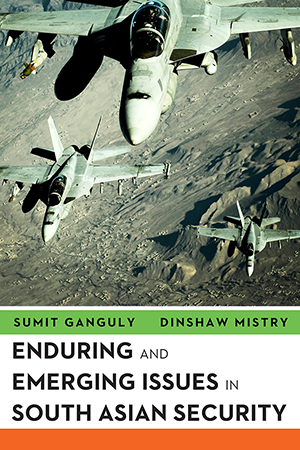

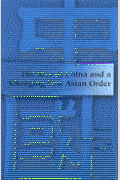
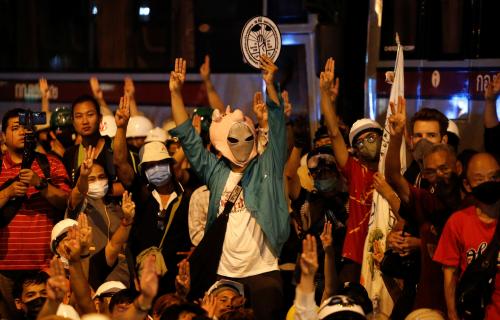
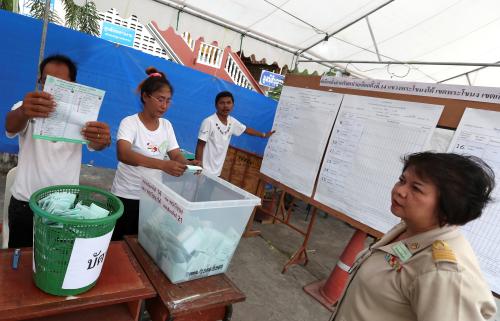
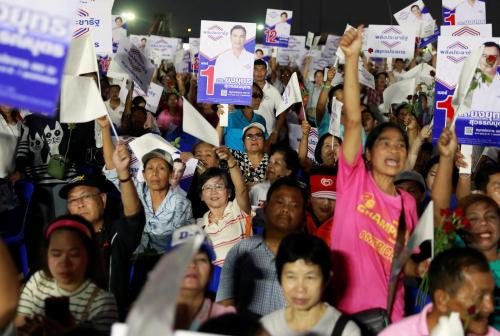


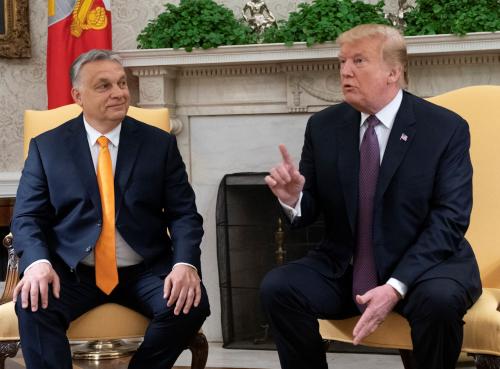
Commentary
Thailand’s election of the century
May 25, 2023